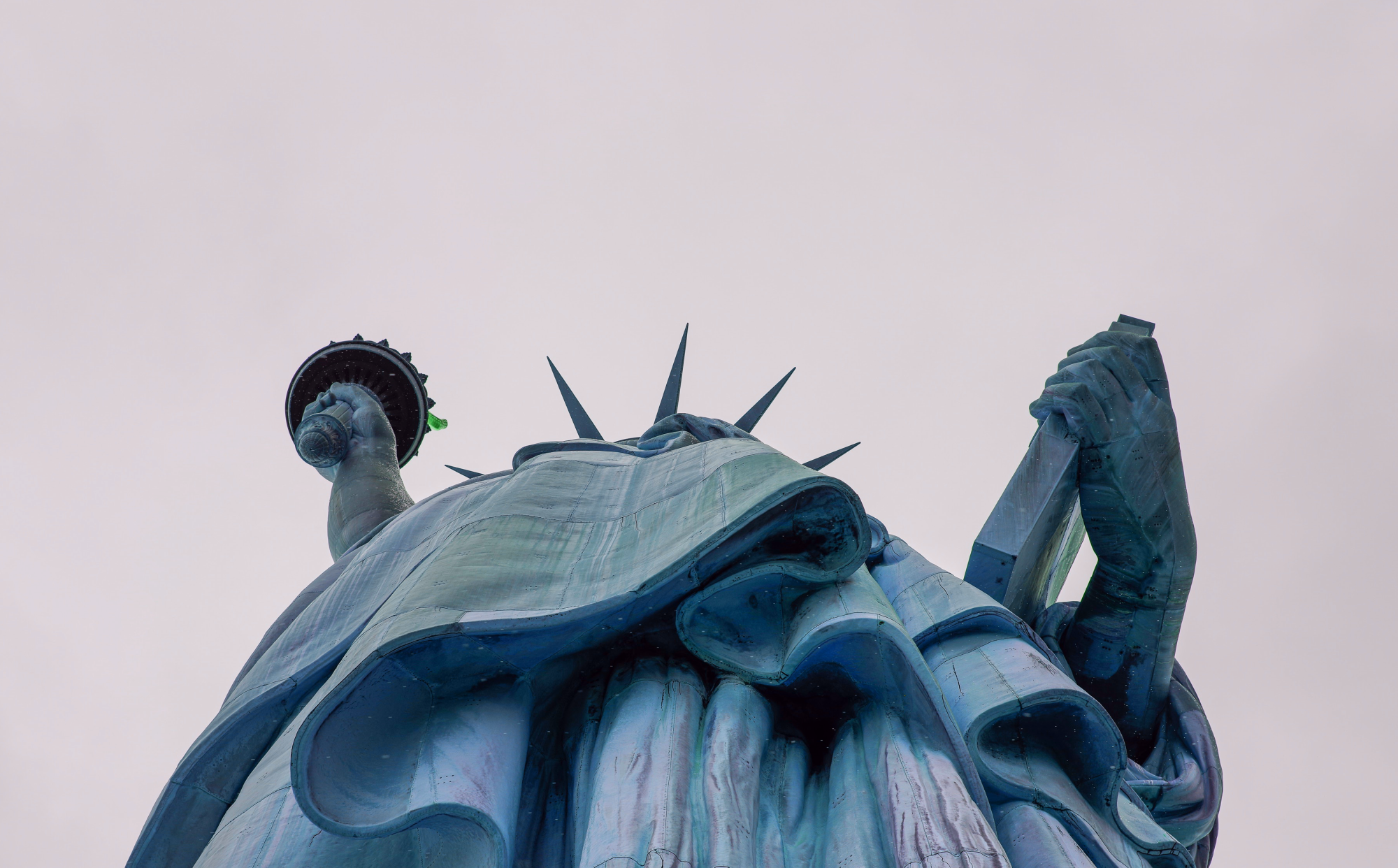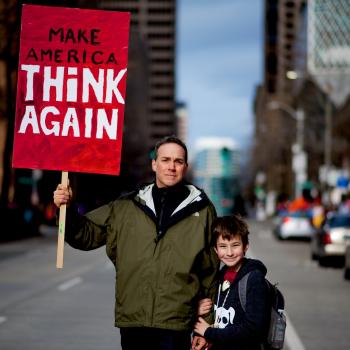
I have a lot of atheist friends, and I’m never defensive when they talk about their disbelief. I get it. There are a lot of days where I dance back and forth between struggling theist and part-time atheist myself.
I don’t wrestle with the same questions that they do. After all, I have an incredible ability to live with ambiguity (but I’m not entirely sure if this is a superpower or a character deficiency). I’m comfortable with unresolved tension and flourish in the midst of uncertainty better than others.
But I’m still plagued by aching, troubling doubt. And it all revolves around one specific issue: I don’t see a lot of spiritual transformation and maturity in Christians. It’s something that used to nag at me quietly, but in the last two years, it’s become a constant, deafening alarm going off in my heart.
Faith and doubt in the Trump age
I posted a story about Trump on Facebook the other day (which I do periodically), and a Trump supporter commented, “Wow. You really don’t like him. Do you?” I can understand how someone could ask that, especially if they’ve spent the last eight years motivated by hatred for Obama (and the last 20 years hating Hillary).
But I don’t hate Trump—he is who he is. We got exactly what we paid for. And I don’t expect that I’m going to support or respect everyone in power. My faith isn’t in empires (even my own) or any political process.
The problem is that evangelical Christians (the group that introduced me to Jesus, and I’ve spent the last 25 years ministering to) are among his biggest supporters. Exit polls from the election suggest that 80 percent of evangelicals voted for him, and even if that estimate is high, what would be an acceptable percentage?
My problem isn’t with Trump as much as it is with those who follow Christ while unquestioningly supporting this administration.
Character matters? Or maybe not
Evangelicals lectured the nation about Bill Clinton’s sin in the 90s. James Dobson wrote a public letter that included the following excerpts:
“What has alarmed me throughout this episode has been the willingness of my fellow citizens to rationalize the President’s behavior even after they suspected, and later knew, that he was lying. Because the economy is strong, millions of people have said infidelity in the Oval Office is just a private affair–something between himself and Hillary. We heard it time and again during those months: “As long as Mr. Clinton is doing a good job, it’s nobody’s business what he does with his personal life.”
“How did our beloved nation find itself in this sorry mess? I believe it began not with the Lewinsky affair, but many years earlier. There was plenty of evidence during the first Presidential election that Bill Clinton had a moral problem. His affair with Gennifer Flowers, which he now admits to having lied about, was rationalized by the American people. He lied about dodging the draft and then concocted an incredulous explanation that changed his story.
He visited the Soviet Union and other hostile countries during the Vietnam War, claiming that he was only an “observer.” Numerous sources reported that he organized and participated in anti-war rallies in the United States, Great Britain, and Norway. Clinton evaded questions about whether he had used marijuana, and then finally offered his now-infamous “I didn’t inhale” response. There were other indications that Bill Clinton was untruthful and immoral. Why, then, did the American people ignore so many red flags? Because, and I want to give the greatest emphasis to this point, the mainstream media became enamored with Bill Clinton in 1992 and sought to convince the American people that “character doesn’t matter.”
“When it comes to leadership, character matters.” That’s what they always told us. Was it all complete nonsense? I mean, I saw them go apoplectic when Barack wore a tan suit, or Michelle wore a sleeveless dress, but so far their support for Trump has been unwavering in spite of:
- An Access Hollywood tape of Trump bragging about sexual assault
- Claims of sexual assault from more than 20 women
- Denials of sexual assault by claiming the accuser was too ugly
- Attacking gold-star father, Khizr Khan
- Suggesting he’d encourage the U.S. military to commit war crimes
- Proposing a database tracking American citizens
- Disparaging John McCain’s military service
- More than 2,000 verifiable lies in the first year in office
- Hundreds who say that Trump doesn’t pay his bills
- Paying a porn star $130,000 to keep quiet about a sexual encounter (affair)
- Calling Africa, El Salvador, and Haiti shitholes
- Frequently insulting opponents, fellow party mates, foreign leaders, and private citizens
- Claims to be a Christian but doesn’t feel the need to ask God for forgiveness
In spite of all this, six out of 10 Trump supporters say that there’s nothing he could do that would make them stop supporting him.
Naming my doubt
My understanding of the New Testament is that the gospel reconciles us with God. As we maintain our connection to Christ, we’re being conformed to his image. We’re becoming like him. While I understand that this process isn’t immediate, it should be cumulative. On the whole, the church should show signs of growing spiritual maturity. That’s why Jesus tells us we will know people by their fruit.
It’s not our profession of faith, our creeds, our words, our prayers, our church attendance, our Bible knowledge, our theology, or our ideology that marks us as Christians—it’s our fruit.
I’ve struggled for a long time trying to reconcile my failings with my beliefs. And this is going to sound harsh, but when I look for mentors and examples of people who have been Christians even longer than me, I wonder if is this all nonsense? Is there any dramatic difference between those who follow Jesus and anyone else?
But like I said, I can live with some ambiguity. This question has nagged at me, but I’ve tried to focus on Jesus and move forward.
But what do you do when everything you’ve been told feels like a lie? In place of spiritual transformation, we’ve accepted a belief system that prioritized dogma and morality. And one of those precepts was that character mattered—but it doesn’t. Ideology does.
Instead of becoming more like Jesus, the church seems to be more concerned with proclamations, moral equivalence, and control.
This is about power, not presence
In the end, this is about fear and power: fear of those immigrants, liberals, and Muslims who are ruining our country, and power to prioritize and legislate our beliefs. This doesn’t just show that evangelicalism is largely unchanged by Christ, but that it might be opposing the spirit of God altogether.
These Christians who went out of their way to disparage Obama’s faith over trivialities are the same people convinced that Trump is a servant of God—despite bushels of fruit that says otherwise.
This has turned my nagging uncertainty about the validity of my faith into a torrential downfall of doubt.
Is there a way forward?
I want to embrace the church of my youth, but I don’t recognize it. The institution that pounded into my head that Jesus always comes first seems entirely too comfortable embracing an”America first” mantra. But if we accept “America first,” don’t we embrace an ideology that prohibits us from even putting Jesus second?
The church told me to count the cost of following Jesus. This meant that I had to be willing to make sacrifices, serve people, and place others before myself. I was to expect persecution, but not look for it—and when I did experience it, I had to leave vengeance to God. I was supposed to love friends and enemies alike. I wasn’t to focus on this world’s treasure, but on the world to come. The cross wasn’t just a tool for my salvation; it was my example and calling.
I believed that. I know that’s what the New Testament teaches. But I don’t see it in public expressions of the church.
No matter how good it is, every nation will have terrible rulers. I’m not surprised that we’d have a Donald Trump any more than I’m surprised that Israel gets a Herod or that Delhi gets a Prince Fakhr Malik. In fact, I’m amazed that it doesn’t happen more often. The people that aspire to that level of power are not generally the ones you want in those positions.
What surprises me is that the church is so lacking in self-reflection that it runs after these people. There are areas of the church that have created a weird Messiah-like narrative about Donald Trump. Steve Strang, the founder of Charisma Magazine, said it this way:
“It’s like the Pharisees in Jesus’ day. Here he was, the promised Messiah, and these are the people who practice Jewish law better than anyone else and they just had a mindset against him and couldn’t see the truth. A lot of people get a mindset, they think a certain way politically . . . and they just think that way and they don’t think for themselves”
His point, which strangely makes Trump a Christ figure, is that people who oppose Trump are blinded by politics—but the criticism is ironic to the point of absurdity.
The truth is that the Pharisees more closely resembled Trump and the evangelical community. Their strong beliefs led them to embrace misogynistic practices. Their hatred of Samaritans stopped them from believing that good people could come from a shithole like Samaria. Their belief in a Jewish manifest destiny led them to embrace a “violence will usher in peace” view of the world.
I couldn’t care less about the liberal/conservative spectrum. I’m here to populate and promote a kingdom that’s to come. In the lottery of places I could have been born, I’m thankful I was born in America, but with privilege comes great responsibility for love and service. We can’t follow Christ and embrace an ideology of isolation. We can’t follow Christ and applaud people in power who devalue and dismiss other struggling nations (especially when their place in the world is due to our exploitation).
Lord I believe, help my unbelief
I’m struggling to follow Jesus, but it’s hard when I look around. Seeing fellow Christians endorse, support, and defend behavior that they wouldn’t accept from someone in their church or parish is so foreign to me. Trump’s rabid support is coming from the church, and the world knows it. Most people understand the gospel well enough to know that the church doesn’t resemble Jesus.
There are so many “nones” (people who have never been part of the church) and “dones” (people who have walked away from the church) who can’t see beyond a church drunk on its power and influence, and I can’t blame them. The Jesus I followed was a champion of normal-everyday people and hated by the establishment. But today the church seems to follow a Christ who’s loved and courted by the establishment and hard on everyday people.
But the biggest obstacle to my faith are those leaders in the church who disagree with what’s going on but are too afraid to upset the people in the pews. They want to maintain peace at all costs. It’s like watching the GOP with Trump. There are a lot of Republicans in power who are opposed to his behavior. They know that this administration is going to hurt the Republican party for years to come, but they don’t want to give up their influence or be ostracized by their party—so they stay quiet and remain complicit. A lot of church leadership operates the same way.
But isn’t that what taking up your cross means? It’s willing to oppose the status quo, upset the moral majority, and shake people out of their self-satisfied stupor, even if you end up crucified. The Jesus I chose to follow wasn’t afraid of telling the truth. He wasn’t scared to flip tables. He wasn’t afraid to stare down Pilate. He wasn’t afraid to be crucified for telling the privileged and powerful the truth.
Where’s that church?















